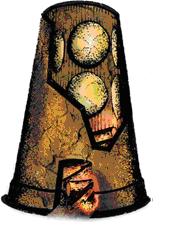In the context of discussions about damage done by fire (esh), our Gemara brings a Mishna from Bava Batra (20b) that teaches that a person cannot place a tanur – an oven – in his house unless there are at least four tefahim of space above it, lest the ceiling catch on fire and it would cause damage to others; and if he wants to place it on an upper floor, he can only do so if there is a ma’azivah – if there is mud, clay and plaster of at least three tefahim between floors. For a kirah – a smaller type of oven – just one tefah would suffice. Even so, if any damage is done, the owner of the oven will have to pay.
According to Rashi, based on this Mishna, members of the community have the right and the responsibility to stop someone from bringing such an oven into the house, unless he takes the proper precautions, since there is a concern for community welfare to ensure that fires will not start. Tosafot suggest that the Mishna is simply offering neighbors who live above or below the planned oven the right to complain and stop him from introducing it, but overall, even Tosafot accept Rashi’s ruling on the matter.
 The tanur that was used in people’s homes at the time of the Mishna was a large, earthen utensil that looked like a very large jug, and was used primarily for baking bread. In order to bake the bread properly, the heat had to be brought to a very high temperature, requiring a large fire. Kirayim were also made of clay, but they were much smaller and had two holes upon which pots or pans could be placed, which cooked over a much smaller fire.
The tanur that was used in people’s homes at the time of the Mishna was a large, earthen utensil that looked like a very large jug, and was used primarily for baking bread. In order to bake the bread properly, the heat had to be brought to a very high temperature, requiring a large fire. Kirayim were also made of clay, but they were much smaller and had two holes upon which pots or pans could be placed, which cooked over a much smaller fire.
You must be logged in to post a comment.